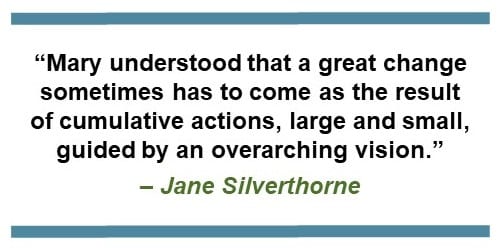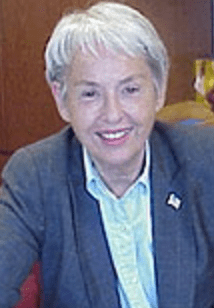News
Reflections on Mary Clutter
We at BTI were deeply saddened to hear of the passing of Dr. Mary Clutter on December 8.
Many know Mary from her time at the National Science Foundation, where she began as Program Director in the 1970s, working her way up to become Assistant Director for the Biological Sciences until she retired in 2005. She was a highly effective advocate for plant science at the agency, and a champion of promoting women in the biological sciences.
BTI was privileged to have Mary serve on our Board of Directors from 2006 – 2013, and she remained a Director Emerita until her passing. We were lucky to have received her wisdom and strength for so many years.
We would like to share with you some reflections on Mary from current and former BTI board members below.
She will be missed.
Jane Silverthorne, member of BTI’s Scientific Advisory Board
“It is difficult to be a pioneer because while you get to be the first, the personal price is high and it is often the people who walk in your footsteps who reap the benefits of your sacrifice. Mary Clutter was a pioneer in many ways. She forged a path for women science administrators at NSF, and her science-first principles coupled with her integrity and commitment changed the agency and the way it works.
Mary was a scientific visionary who also understood the value of sharing and collaboration in moving science forward. She understood that a great change sometimes has to come as the result of cumulative actions, large and small, guided by an overarching vision. In this way, she championed the cause of women scientists by giving them a seat at the table – whether on a panel, an advisory committee or as a speaker – because she knew that once they had a chance to be seen and heard, they would have access to all the career and funding opportunities. It was a privilege to be one of the science administrators to whom Mary gave such an opportunity, and to have the chance to see Mary’s energy and enthusiasm in action every day at NSF.
In her retirement, she was a friend and mentor who reminded us to keep our priorities straight while always encouraging us to aim higher. She loved serving on the BTI Board and very much enjoyed the meetings in Ithaca. Mary changed people’s lives and her legacy is in all the possibilities we enjoy because she was with us.”
Machi Dilworth, former member of BTI’s Board of Directors and Scientific Advisory Board
“Mary Clutter was an exceptional person. Although she was best known for her administrative leadership, she considered herself a scientist first. Everything she did was to advance science and nurture the next generation of scientists. She came to NSF in the mid-1970’s and steadily ascended the leadership ladder, becoming Assistant Director for Biological Sciences in 1989, the position she held until her retirement in 2005. This was the period when the field of biological sciences was completely transformed due to the advances in genomics, information and computer sciences, imaging technologies, and other technological advances, and her actions had a profound impact to all fields of biology under the NSF purview.
 Her scientific roots were in plant biology. She recognized the central importance of plants in sustaining life on earth. She also recognized the woeful under-funding of basic plant science research, which was inhibiting advancement of the field. She devoted her life to correcting this situation. One of her early efforts was establishment of the NSF postdoctoral research fellowships in plant biology in 1982. The program supported over 230 fellows including BTI’s David Stern and Greg Martin.
Her scientific roots were in plant biology. She recognized the central importance of plants in sustaining life on earth. She also recognized the woeful under-funding of basic plant science research, which was inhibiting advancement of the field. She devoted her life to correcting this situation. One of her early efforts was establishment of the NSF postdoctoral research fellowships in plant biology in 1982. The program supported over 230 fellows including BTI’s David Stern and Greg Martin.
Her most visible and grand initiatives were the Arabidopsis genome research initiative and the Plant Genome Research Program. She was also a champion of promoting women and other under-represented groups in STEM. There could be a much longer list of her contributions, but suffice it to say that plant science would not be where it is today if it were not for Mary.”
David Stern, BTI President, CEO and Board of Directors
“I first encountered Mary at an NSF panel meeting in 1997. She would always come in at the beginning of panels for pep talks, to explain what NSF was about and what our job as panelists was. She was not shy about expressing her opinion, which, along with her creativity and intelligence, was one reason she was such a strong leader at NSF. A lot of us in plant science owe a debt to Mary, because she always stood up for plants and in addition, developed other supporters and leaders such as Machi Dilworth and Jane Silverthorne.
When the opportunity arose to recruit Mary to the BTI Board of Directors, it was a “no-brainer” because her intellectual strength and communications skills were bound to be enormous assets. While on the board, she had a knack for getting to the crux of what had appeared to be complicated issues in her friendly but no-nonsense way.
I continued to socialize with Mary after her departure from the Board of Directors. She was a relentless thinker about the future: the future of science, of BTI, and of the arc of my own career. There were a lot of things that she cared about. She really was a giant.”


